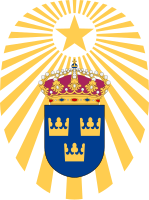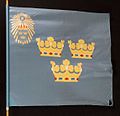Svea Engineer Corps
| Svea Engineer Corps | |
|---|---|
| Svea ingenjörkår | |
 | |
| Active | 1855–1997 |
| Country | |
| Allegiance | Swedish Armed Forces |
| Branch | Swedish Army |
| Type | Engineer |
| Size | Corps |
| Part of | 4th Military District (1855–1893) 4th Army Division (1893–1901) IV Army Division (1902–1927) Eastern Army Division (1928–1936) IV Army Divisoon (1937–1942) IV Military District (1942–1966) Eastern Military District (1966–1991) Middle Military District (1991–1997) |
| Garrison/HQ | Almnäs |
| Motto(s) | Över och genom alla hinder ("Over and through all obstacles") |
| Colors | Black |
| March | "På vakt" (Rydberg)[note 1] |
| Insignia | |
| Branch insignia |  |
| Cap badge |  |
| Shoulder sleeve insignia |  |
The Svea Engineer Corps (Swedish: Svea ingenjörkår), designation Ing 1, was a Swedish Army engineer unit that traced its origins back to the 19th century. It was disbanded in 1997. The unit was garrisoned in Uppland and Södermanland.
History
The unit has its origins in Sapper Company raised in 1855. The company was reorganised to a battalion-sized unit in 1864 and was renamed Sapper Corps. This unit was transformed to a pontoon bridge battalion, Pontoon Battalion, in 1867. The battalion then changed its name once again in 1893 to Svea Engineer Battalion, and in 1902 to Svea Engineer Corps, when it gained the designation Ing 1 (1st Engineer Regiment). That same year, the field telegraphy company that had been attached to the unit became independent and later formed Uppland Regiment.
Svea Engineer Corps was upgraded to a regiment in 1957 and was renamed Svea Engineer Regiment. It was then downgraded to a battalion unit again in 1994, just three years before the unit was disbanded, in 1997. The regiment was garrisoned in Stockholm, Solna and Södertälje during its lifetime.
Organisation
- ?
Heraldry and traditions
Coat of arms
The coat of the arms of the Svea Engineer Regiment (Ing 1) 1977–1994 and the Svea Engineer Corps (Ing 1) 1994–1997. Blazon: "Azure, the lesser coat of arms of Sweden, three open crowns placed two and one The shield surmounted a cluster of rays coming down from a mullet, or".[2]
Colours, standards and guidons
The colour of Ing 2 was presented on 26 September 1935 by His Majestyg the King Gustaf V at the 300th Anniversary of the Fortifikationen ("Royal Engineers") in Stockholm. It was carried from 1 January 1998 by the Norrland Engineer Corps. When the colour was taken out of use, it was not handed over to the Swedish Army Museum but was exhibited at Ing 1's museum on Laxön. The colour couldn't therefore be admitted to the Swedish Army Museum collection until 2012.
- The 1935 colour
- The 1969 colour
Medals
In 1997, Svea ingenjörskårs (Ing 1) minnesmedalj ("Svea Engineer Corps (Ing 1) Commemorative Medal") i silver (SveaingSMM) of the 8th size was established. The medal is oval and the medal ribbon is divided in black, yellow and black moiré.[3]
- Svea Engineer Corps (Ing 1) Commemorative Medal
Commanding officers

Regimental commanders and battalion and corps commanders between 1900 and 1997.
- 1900–1904: Nils Gustaf Stedt (also commander of the Field Telegraph Corps (Ing 3).
- 1904–1910: Georg Juhlin-Dannfelt
- 1910–1915: August Fredrik Thorssell
- 1915–1915: Hjalmar Ertman Smitt
- 1915–1920: Erik Conrad Eriksson
- 1920–1924: Karl Amundson
- 1924–1926: Sven Erik Bjurgren
- 1926–1931: Gustaf Julius Rabe
- 1931–1934: Sven Alin
- 1934–1941: Sven Eberhard Tydén
- 1941–1941: Gunnar Edward Ström
- 1941–1948: Anders Walther Graûmann
- 1948–1953: Wilhelm Gottlieb Dahlgren
- 1953–1959: Axel Welin
- 1959–1965: Nils Christian Rabe
- 1965–1969: Åke Bernström
- 1969–1975: Kåre Svanfeldt
- 1975–1981: Anders Jonsson
- 1981–1982: Bengt Gustafsson
- 1982–1984: Sven-Erik Nilsson
- 1984–1989: Lars-Åke Persson
- 1989–1989: Carl Göran Gerhard De Geer
- 1989–1990: Björn Falkenström (acting)
- 1990–1994: Björn Falkenström
- 1994–1997: Christer Wulff
Names, designations and locations
| Name | Translation | From | To | |
|---|---|---|---|---|
| Kungl Sappörkompaniet | Royal Sapper Company | 1855 | – | 1864 |
| Kungl Sappörkåren | Royal Sapper Corps | 1864 | – | 1866-12-31 |
| Kungl Pontonjärbataljonen | Royal Pontoon Battalion | 1867-01-01 | – | 1892-12-31 |
| Kungl Svea ingenjörbataljon | Royal Svea Engineer Battalion | 1893-01-01 | – | 1901-12-31 |
| Kungl Svea ingenjörkår | Royal Svea Engineer Corps | 1902-01-01 | – | 1957-06-30 |
| Kungl Svea ingenjörregemente | Royal Svea Engineer Regiment | 1957-07-01 | – | 1974-12-31 |
| Svea ingenjörregemente | Svea Engineer Regiment | 1975-01-01 | – | 1994-06-30 |
| Svea ingenjörkår | Svea Engineer Corps | 1994-07-01 | – | 1997-12-31 |
| Designation | From | To | ||
| Ing 1 | 1902-01-01 | – | 1997-12-31 | |
| Location | From | To | ||
| Stockholm | 1855 | – | 1922-11-29 | |
| Frösunda | 1922-11-30 | – | 1970-06-30 | |
| Almnäs Garrison | 1970-07-01 | – | 1997-12-31 |
See also
Footnotes
References
Notes
- ^ Sandberg 2007, pp. 42, 65
- ^ Braunstein 2006, p. 35
- ^ Braunstein 2007, p. 103
- Braunstein, Christian (2006). Heraldiska vapen inom det svenska försvaret [Heraldry of the Swedish Armed Forces] (PDF). Skrift / Statens försvarshistoriska museer, 1101-7023; 9 (in Swedish). Stockholm: Statens försvarshistoriska museer. ISBN 91-971584-9-6. SELIBR 10099224.
- Braunstein, Christian (2007). Utmärkelsetecken på militära uniformer [Decorations on Swedish military uniforms] (PDF). Skrift / Statens försvarshistoriska museer, 1101-7023; 12 (in Swedish). Stockholm: Statens försvarshistoriska museer. ISBN 978-91-976220-2-8. SELIBR 10423295.
- Sandberg, Bo (2007). Försvarets marscher och signaler förr och nu: marscher antagna av svenska militära förband, skolor och staber samt igenkännings-, tjänstgörings- och exercissignaler (in Swedish) (New ed.). Stockholm: Militärmusiksamfundet med Svenskt marscharkiv. ISBN 978-91-631-8699-8. SELIBR 10413065.
Further reading
- Bernström, Åke, ed. (1992). Svea ingenjörregementes historia (in Swedish). Södertälje: Svea ingenjörregemente. SELIBR 1492089.
- Svea ingenjörregementes historia. Almnäs, Strängnäs eller Eksjö : ett regementes strid för överlevnad : komplement (in Swedish). Södertälje: Svea ingenjörregemente. 1994. SELIBR 1492090.



